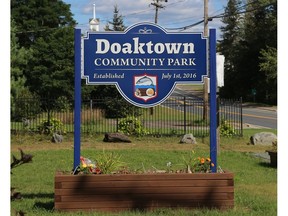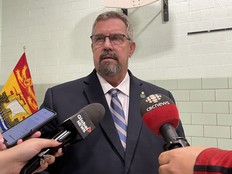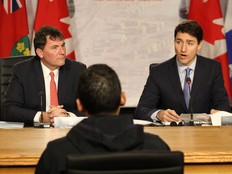The ugly side of municipal reform
Mayor of small village says taxes are rising fast and public services are barely keeping up

Article content
Art O’Donnell views Jan. 1, 2023, as a black day on the calendar.
That’s the day when his village in the middle of the province was forced to join a neighbouring community, under orders from the Progressive Conservative government, as part of big municipal reforms.
The mayor of Doaktown has welcomed the people from the Parish of Blissville into the fold. He just doubts they’re happy to be part of it.
O’Donnell says the amalgamation has led to two outcomes: taxes for Blissville are going up – way up – while spending in important areas such as roadwork, facility upgrades and beautification is nowhere near adequate.
“I’ve had people who have lived here for generations and told me they can’t survive and have to move,” the mayor said in an interview. “The provincial government pushed municipal reform too fast. I don’t know if we’ve gone beyond the point of no return, and I don’t know if the reforms can be revisited, but they need to make more money available.”
An ‘unsustainable’ model?
His village isn’t alone in trying to sort out its financial problems.
In December, the province released a report by two Université de Moncton economic professors who took a careful look at the state of municipal and regional finances in New Brunswick.
It warned that the current financial model for local governments was not sustainable and that a comprehensive review of the situation was urgently needed.
Glen Savoie, the local government minister, wasn’t made available for an interview, but he has repeatedly promised to hold a summit with municipal leaders on further changes, what he likes to call municipal reform 2.0.
In their study, the economists predicted the local governments that would struggle the most would be the smaller ones that did not hit two key metrics – a property tax base of at least $300 million and a population of 4,000.
It’s easy to see why. Local governments in New Brunswick still draw most of their money from property taxes, about 80 per cent of their budgets, and the provincial government gives them very little authority to gain revenues in other ways.
I’ve had people who have lived here for generations and told me they can’t survive and have to move.
Art O'Donnell
Without enough properties to tax, those municipalities won’t be able to fund the services demanded of them, unless they drastically raise rates.
Of New Brunswick’s 89 local governments, 30 of them find themselves in the smaller category.
That includes 18 municipalities and all 12 rural districts. The municipalities with a small tax base and population are dotted all over the province: Alnwick, Belledune, Bois-Jolie, Campobello Island, Doaktown, Fredericton Junction, Grand Manan, Kedgwick, Lakeland Ridges, McAdam, Neguac, Nouvelle-Arcadie, Riviere-du-Nord, Saint-Quentin, Strait Shores, Tobique Valley, Tracy and Upper Miramichi.
Influx of newcomers clouds the picture
But the devil is also in the details.
The report’s authors, André Leclerc and Pierre-Marcel Desjardins, predicted that up to 29 local governments – or one-third of the total – would struggle for a variety of reasons, but mainly because they wouldn’t grow fast enough.
Take Doaktown, whose population increased from 880 to 1,400 after joining its neighbouring community.
As part of the reforms imposed by the Higgs Tory government, the property tax rates for Doaktown and Blissfield are supposed to equalize over a five-year period. But there’s a huge gap. Doaktown residents pay $1.52 per $100 of assessed property, while homeowners in Blissfield pay $1.12.
To make up for that difference, Blissfield residents can expect their tax rate to increase by 36 per cent in just five years.
In practical terms, that means someone with a house valued at $200,000 in the rural area would see their annual tax bill go from $2,240 to $3,040.
But that’s not the worst of it. O’Donnell said an influx of newcomers seeking wide open spaces and smaller crowds during the pandemic were willing to pay a higher price for homes. That’s pushed property values up and everyone’s taxes even higher.
“For the people of Blissfield, their taxes are going way up and it’s happening just after people from central Canada flocked here during the pandemic,” he said. “It’s a mess.”
O’Donnell says more than half of Doaktown’s $1.8-million annual budget is absorbed by fixed costs that the municipality has no control over – policing, insurance, garbage removal and the like.
That leaves little discretionary funding for items that many people still consider important, like roadwork.
“For the most part we are just patching our roads,” O’Donnell said. “We have enough money to do half a kilometre of paving a year if we’re lucky. The provincial government tells us we have to create a reserve and build it up to pay for the roads. But there’s no extra money to build a reserve. We’re just trying to hold everything together with the budget we have.”
Downloading responsibilities
The economists said one of the problems is the province has downloaded more responsibilities on local governments, gradually shifting them away from strictly property services.
They warned that the municipalities’ high dependence on property taxes has put a big burden on property owners, pointing to census data from Statistics Canada.
While average New Brunswick household income increased by 17 per cent between 2016 and 2021, the average home value increased by 22 per cent and property taxes by closer to 24 per cent. This is reflected in higher taxes.
They said given the situation, it would make sense to give municipalities more financial options.
The current “funding model is not sustainable in the long term,” they said, arguing a new model should replace it that ensures proper equalization payments between municipalities, one that respects the old principles of the 1960s Equal Opportunity program that strove for equality between wealthier and poorer communities.
They also said it was important for the province to identify “new funding sources for local governments that are in line with the new reality of their responsibilities.”
A less jaundiced view
Some on the “too small” list had a less jaundiced view than Doaktown’s mayor.
Bonnie Morse, the mayor of Grand Manan, says her village also struggles financially, but she doesn’t know how the province’s forced amalgamations, reducing local governments from more than 300 entities to 89 in one fell swoop, could have helped her island.

“It doesn’t make sense for us to be part of another municipality because of where we are, with an ocean between us and Campobello Island,” she said. “And because of where we are – an island – we’re limited in what our tax base is going to be. We just don’t fit anywhere else because we can’t. So, we have what we have, and we have to make the best of it.”
Despite having a population of only 2,600, the village has its own rink because people won’t take a three-hour roundtrip on the ferry to Blacks Harbour to skate.
When it comes to garbage, the village must pay more than most places. It has its own transfer station on the island and then all the waste is loaded onto trucks that take the ferry to get to the Lawrence Station landfill on the mainland, a very expensive route.
We just don’t fit anywhere else because we can’t. So, we have what we have, and we have to make the best of it.
Bonnie Morse
So far, Grand Manan village council has been able to keep the tax rate stable, cutting it by half a penny to close to $1.22, because property values have risen, providing it more revenue. But she says there isn’t a lot of wiggle room in the budget.
“That’s why we looked forward to the fiscal summit that the province was going to have last fall,” she said, referring to the municipal summit that Savoie abruptly cancelled because he said not enough financial data was available to have meaningful discussions.
“We want to see what some of the options are. What could fiscal reforms look like for a municipality like ours? Because it doesn’t make sense for us to be different than what we are by joining us with some other municipality.”
Among the ideas listed by the two professors: the province could transfer a portion of personal income taxes, corporate taxes, sales taxes or gasoline taxes to municipalities.
The province could also extend municipalities a credit for the harmonized sales tax and provide them more revenues from gambling, traffic fines or cannabis sales. Further options include providing local governments with a portion of natural resources royalties or allow them to charge an entertainment tax on shows or movie theatres.
Such fiscal measures have been suggested by municipal leaders before. Provincial officials in the past have pointed out they would lose revenues for important services such as education and health, and municipalities might overtax their citizens.
Not all villages cry foul
Another municipality that finds itself on the “too small” list says it’s doing just fine.
Belledune in northern New Brunswick did not amalgamate with any of its neighbours as part of municipal reforms.
It would make sense there would be some growing pains with it. And like any other initiative, some adjustments probably have to be made.
Paul Arseneault
Mayor Paul Arseneault says the village’s tax base is close to $258 million, just under the $300 million threshold, and it’s able to make ends meet easier than a place like Doaktown, whose tax base is only $88 million.
“We haven’t felt like it’s an issue for us,” he said. “We finished our budget satisfied that we’d still be able to finish the projects we’d anticipated.”
The mayor says people shouldn’t forget that the municipal government reforms were the biggest in more than 60 years in New Brunswick. And he’s counting on the Tory government to make changes to help floundering municipalities.
“We in Belledune did not experience a negative impact following all the amalgamations. That may not be the case for many municipalities because every municipality is unique, and I can’t speak to that. But from what I’ve read, there were probably some growing pains with the amalgamations. It was a lot to take on. It was a huge initiative. So, it would make sense there would be some growing pains with it. And like any other initiative, some adjustments probably have to be made.”
Mayor asks for people to speak out
There has been help for smaller municipalities, but it’s been fleeting.
The province created a one-time transition fund in 2023 for certain municipalities following the big reform, worth $10 million. Doaktown’s share was $87,000.
It lasted only one year.
The mayor has tried to explain the situation to residents in the village’s online community newsletter. O’Donnell encouraged citizens in the traditionally Tory enclave to speak out.
“I will leave you with one last thought,” the mayor wrote in the February edition. “It doesn’t mean you are not supporting your party if you question their decisions. We must ensure that our representatives at the federal and provincial level know we deserve sufficient money to operate. We have a voice, and it is more powerful if spoken by all.”












Postmedia is committed to maintaining a lively but civil forum for discussion. Please keep comments relevant and respectful. Comments may take up to an hour to appear on the site. You will receive an email if there is a reply to your comment, an update to a thread you follow or if a user you follow comments. Visit our Community Guidelines for more information.